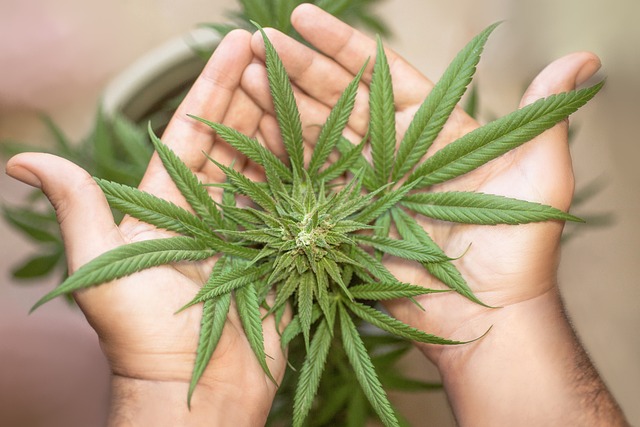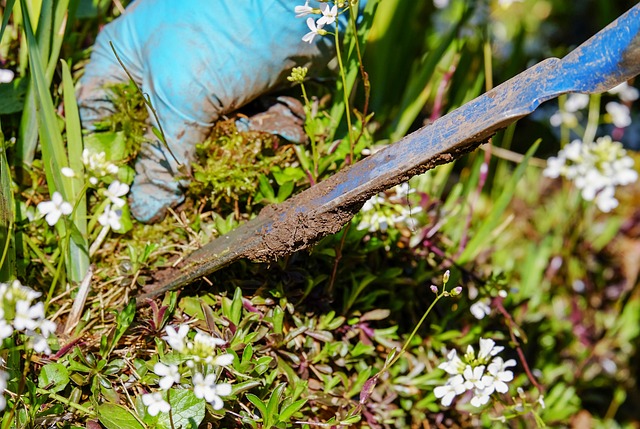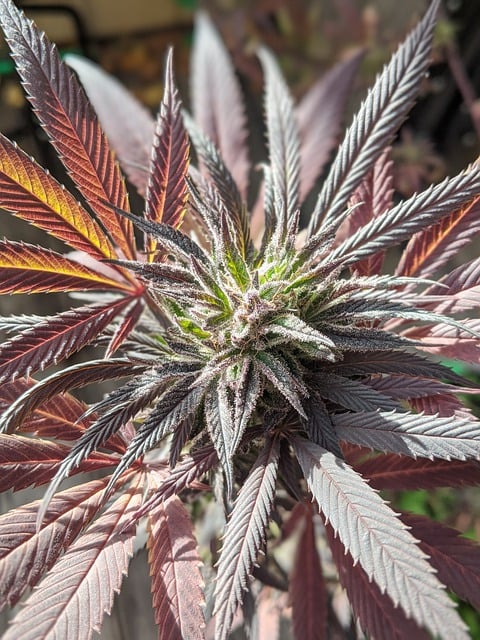Massachusetts has become a pioneering state in the exploration of THCA (Tetrahydrocannabinolic Acid), a non-psychoactive compound found in cannabis that offers potential health benefits such as anti-inflammatory and neuroprotective properties. Unlike its psychoactive counterpart THC, THCA does not induce a 'high' and is legal in Massachusetts, allowing for safe and regulated access to its therapeutic effects. The state's adult-use cannabis program has facilitated the availability of THCA flowers, which are rich in this compound. These flowers are gaining popularity as an alternative to traditional cannabis products for individuals seeking wellness benefits without psychoactive side effects. Research is underway to further understand and validate the therapeutic potential of THCA for conditions like arthritis, neurodegenerative diseases, nausea, and loss of appetite, with Massachusetts' regulatory framework supporting these scientific endeavors. The state's progressive stance on cannabinoid research positions it as a leader in the potential health applications of THCA.
Exploring the multifaceted benefits of THCA-rich flowers, this comprehensive article illuminates their emerging role within the cannabis landscape, particularly in Massachusetts. Herein, we delve into the science behind THCA’s potential, its legal status, and how it differs from Delta-9 THC. We navigate the cultivation practices that yield these beneficial blooms, and discuss their health implications, consumption methods, and safety considerations. As cannabis legislation evolves, Massachusetts stands at the forefront of THCA flower utilization, offering insights into both its current and future significance in therapeutic and recreational contexts. Join us as we dissect the entourage effect and analyze the therapeutic properties that position THCA-rich flowers as a significant addition to the cannabis offerings in Massachusetts.
- Unlocking the Potential of THCA Flower: A Legal Option in Massachusetts
- The Science Behind THCA: What Makes It Beneficial?
- THCA Flower vs. Delta-9 THC: Understanding the Differences
- The Rise of THCA Flowers in Massachusetts: Legality and Accessibility
- Potential Health Benefits of THCA Flowers
Unlocking the Potential of THCA Flower: A Legal Option in Massachusetts

In recent years, there has been a growing interest in the therapeutic properties of cannabinoids, with THCA (Tetrahydrocannabinolic Acid) garnering significant attention. Massachusetts, having legalized the recreational use of cannabis, including its various forms, provides a legal avenue for exploring the potential benefits of THCA flower. Unlike its psychoactive counterpart THC (Tetrahydrocannabinol), THCA is non-psychoactive, allowing users to experience its wellness effects without the traditional ‘high.’ The unique properties of THCA are attracting both researchers and consumers, with studies suggesting it may offer anti-inflammatory, neuroprotective, and analgesic effects. As a result, many in Massachusetts are turning to THCA flower as a natural alternative for managing pain, reducing inflammation, and potentially mitigating neurodegenerative symptoms. The legality of THCA flower in Massachusetts opens up a world of possibilities for those interested in the potential health benefits of cannabinoids, without the legal or psychoactive concerns associated with other cannabis products. This presents an exciting opportunity for individuals to explore the wellness advantages of THCA within a regulated and compliant framework.
The Science Behind THCA: What Makes It Beneficial?

Delta-9 tetrahydrocannabinol (THC) is well-known for its psychoactive properties, but before it undergoes decarboxylation through heating, it exists in the raw form known as tetrahydrocannabinolic acid A (THCA). THCA is non-psychoactive and is one of the many cannabinoids found in the Cannabis sativa plant. Scientific research has shown that THCA interacts with the body’s endocannabinoid system, which regulates a range of functions and maintains homeostasis. In its natural state, THCA possesses several potential health benefits without the psychotropic effects associated with THC.
In Massachusetts, where the use and cultivation of cannabis for medical and adult-use recreationally have been legalized, THCA has garnered attention due to its therapeutic properties. Studies indicate that THCA may offer anti-inflammatory, neuroprotective, and analgesic effects, making it beneficial for conditions like arthritis, multiple sclerosis, and neuropathic pain. Moreover, preliminary research suggests that THCA could have antiemetic properties, which might be particularly useful for individuals undergoing chemotherapy. The legal status of THCA in Massachusetts allows researchers to explore its benefits further, potentially leading to new therapeutic applications within the state’s regulated cannabis market.
THCA Flower vs. Delta-9 THC: Understanding the Differences

Delta-9 tetrahydrocannabinol (Delta-9 THC) is a well-known psychoactive cannabinoid found in cannabis sativa, commonly associated with the intoxicating effects and therapeutic properties of marijuana. On the other hand, Tetrahydrocannabinolic Acid (THCA) is its non-psychoactive precursor, which only becomes psychotively active when heated above a certain temperature, converting into Delta-9 THC. Both compounds are present in raw cannabis plants and flowers, with THCA being abundant in flower buds before they are decarboxylated—a process involving the application of heat that transforms THCA into Delta-9 THC.
In Massachusetts, where the recreational use of cannabis is legal, THCA has gained attention due to its potential health benefits and its non-psychoactive nature, which allows for broader applications and usage without the “high” typically associated with cannabis consumption. Unlike Delta-9 THC, THCA interacts with the body’s endocannabinoid system in a way that may offer anti-inflammatory and neuroprotective benefits. This has led to an increasing interest in raw cannabis flowers containing high levels of THCA for wellness purposes, as they can be consumed without the psychoactive effects that might be desirable or inconvenient for certain individuals or situations. The legal landscape in Massachusetts allows consumers to explore and utilize THCA-rich products, either by using them directly or through specific extraction processes that preserve its benefits without the psychotropic component.
The Rise of THCA Flowers in Massachusetts: Legality and Accessibility

In recent times, THCA (Tetrahydrocannabinolic Acid) flowers have gained prominence within the Massachusetts cannabis market, riding the wave of legalization that has opened new avenues for consumers. The state’s progressive stance on cannabis, culminating in the Massachusetts Adult-Use Cannabis Program, has facilitated a legal framework where THCA flowers can be readily accessed and enjoyed by adults over 21 years of age. Unlike its psychoactive counterpart THC (Tetrahydrocannabinol), THCA exists in its raw form before heating, which decarboxylates it into THC. This precursor offers a range of potential benefits, as it is believed to possess anti-inflammatory and neuroprotective properties, although further research is needed to fully understand its effects. Massachusetts’ regulatory environment has been instrumental in ensuring that THCA flowers are sold in licensed dispensaries, adhering to strict quality and safety standards, thus providing a reliable source for consumers interested in exploring the benefits of this non-intoxicating cannabinoid. As a result, THCA legal status in Massachusetts has positioned the state at the forefront of cannabinoid innovation, offering consumers an alternative option within their legal rights to use cannabis products. The accessibility and legality of THCA flowers in Massachusetts have not only democratized this potentially beneficial substance but also signal a broader shift towards a more informed and health-conscious approach to cannabis consumption.
Potential Health Benefits of THCA Flowers

THCA, or Tetrahydrocannabinolic Acid, is a non-psychoactive compound found in the Cannabis sativa plant that has garnered attention for its potential health benefits. As THCA legal status becomes more defined, such as within Massachusetts, consumers and researchers are exploring its therapeutic properties. Preliminary studies suggest that THCA may offer a range of wellness benefits without the psychoactive effects associated with its decarboxylated form, THC. For instance, THCA has been studied for its anti-inflammatory and neuroprotective effects, which could be beneficial in managing conditions like arthritis or neurodegenerative diseases. Additionally, it is being investigated for its potential role in reducing nausea and stimulating appetite, attributes that could be advantageous for individuals undergoing chemotherapy or those with eating disorders.
In Massachusetts, where THCA flowers are within the legal framework, interest in their potential health applications has grown. These flowers contain higher levels of THCA than other cannabinoids because they are typically harvested before reaching the maturity where THC becomes predominant. The presence of THCA in a legal context allows for more controlled and scientifically rigorous research into its efficacy and safety, providing valuable insights into how it might be used to support health and wellness. As such, THCA flowers are becoming a subject of interest among both medical professionals and consumers looking for natural ways to enhance their well-being without the mind-altering effects of cannabis.
2023 has marked a significant shift in the understanding and utilization of THCA flower benefits, particularly within Massachusetts where it’s been recognized as a legal option. The scientific community continues to explore the potential health advantages associated with THCA, offering insights into its distinct effects compared to Delta-9 THC. As accessibility to these flowers has increased, so too has their popularity among those seeking alternative wellness solutions. In light of these developments, it’s clear that THCA flower holds a promising place in the cannabinoid landscape of Massachusetts and beyond, meriting further research to unlock its full potential for well-being.
